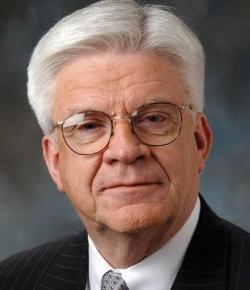Wayne State targets tenure
reports on a new assault on academic freedom at Wayne State.
THE ADMINISTRATION at Wayne State University, a major public university in Detroit, wants to abolish tenure.
The move, made at a July 17 bargaining session, came as a surprise to members of the faculty union, American Association of University Professors/American Federation of Teachers Local 6075. Many expressed shock and outrage.
Charles Parrish, president of the AAUP at Wayne State, explained his union's stance to the media: "It is pretty clear that...this would eliminate tenure. There is none of the traditional peer review that is characteristic at every university that I know of any reputation whatsoever."
Michael McIntyre, a former union negotiator and a Wayne State law professor, explained the stakes in this struggle in the faculty union's newsletter:
The administration will soon find that it is not simply bargaining with the university's union. It has engaged itself in a major dispute with the entire academic community that it ultimately cannot win and that will do serious harm to the university due to the highly negative responses its actions will provoke.

McIntyre also noted that the university's claim of financial necessity for this move was a cover for a broader agenda to eliminate job security for faculty:
The administration already has the power to fire faculty and academic staff in the face of an economic emergency. What it apparently wants is the authority to fire people if it chooses to spend money to advance some agenda that it considers more important than retaining faculty and academic staff, even if these people are performing their jobs at least adequately and perhaps very well or even brilliantly.
If the proposal were to go through, Wayne State would become the first research university in the country to abolish tenure. The administration proposes a system in which school officials would be able to fire faculty independent of peer review and which would allow for "financially based reduction[s] in force."
When union negotiators asked if the proposals would indeed abolish tenure, the administration's chief negotiator replied that they "would have that effect, yes."
THE ATTACK on tenure comes in the second year of Allan Gilmour's presidency at Wayne State. Gilmour is the former vice chairman of Ford Motor Company and has sat on the boards of DTE Energy, Dow Chemical, Prudential Financial and Whirlpool. Unlike previous Wayne State presidents, Gilmour worked exclusively in the corporate world before his presidency at Wayne--a presidency that university publications sometimes refer to as Gilmour's "encore career."
During Gilmour's time at Wayne, the university has increasingly adopted corporate language and tactics when implementing layoffs, in contract negotiations, and in ending long-standing programs such as American Studies.
Faced with the backlash over his administration's contract proposals, Gilmour issued a statement denying that he was out to eliminate tenure: "The vast majority of our faculty are excellent, and do an outstanding job of teaching and research...It is the small minority who require more care on our part. Yes, they are very few, but even one is too many, and we need to be able to address these problems quickly and fairly. That is the purpose of the proposals being misinterpreted as eliminating tenure."
The union isn't buying that story. "They maintain people will still go through the tenure process, but they can be eliminated any time the administration feels like it," said Parrish, the local union president. "I do not frankly understand the why, or what it is they're hoping to do as a university. The idea that we have some louts here who aren't working--it's just not true."
Historically, many of Wayne State's students have come from the city's underfunded public schools, and the university has a more working-class student body than most. Public education for poor and working-class people is under attack at all levels in Detroit. Detroit Public Schools teachers, for instance, are currently fighting against a contract that would allow class sizes to go up to 60 for grades 6 to 12.
Both this year and last year, DPS teachers have been routinely laid off at the end of the school year and forced to wait until only weeks before school begins to hear whether they have jobs for the coming year.
At the University of Virginia--an elite public research university--recent attempts by the 1 percent to model the university on a corporation failed because of massive student and faculty resistance.
Now that same battle has come to Detroit. As a working-class university in a majority African American city hit particularly hard by austerity measures, Wayne State may seem like an easier target to the corporate powers interested in dismantling secondary public education. If the administration succeeds at dismantling tenure, though, Wayne will surely set a precedent for similar attacks on academic freedom at other public universities across the country.
A rally to support the bargaining team will take place outside of the Faculty Administration Building at 10 a.m. on Friday, July 27.


